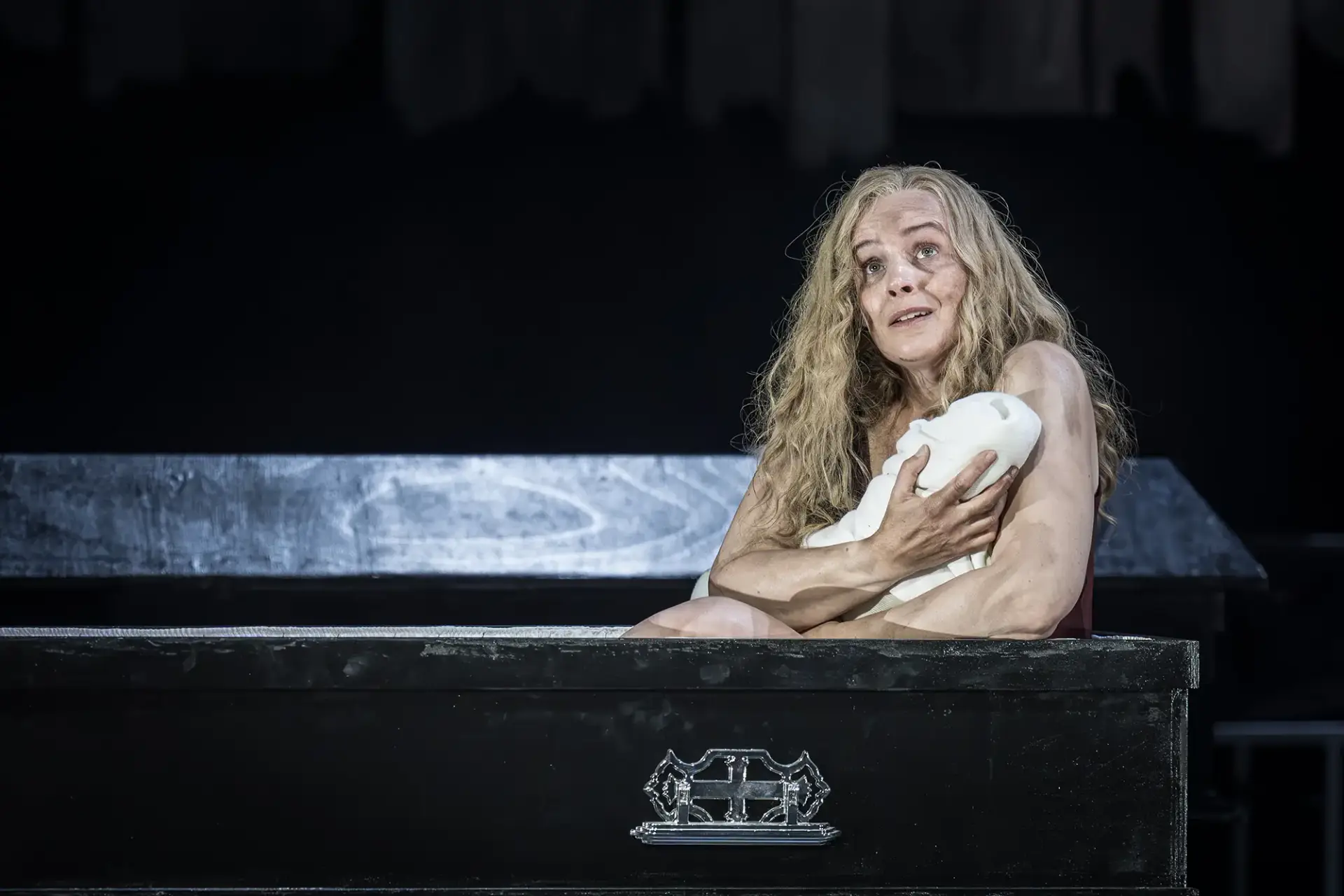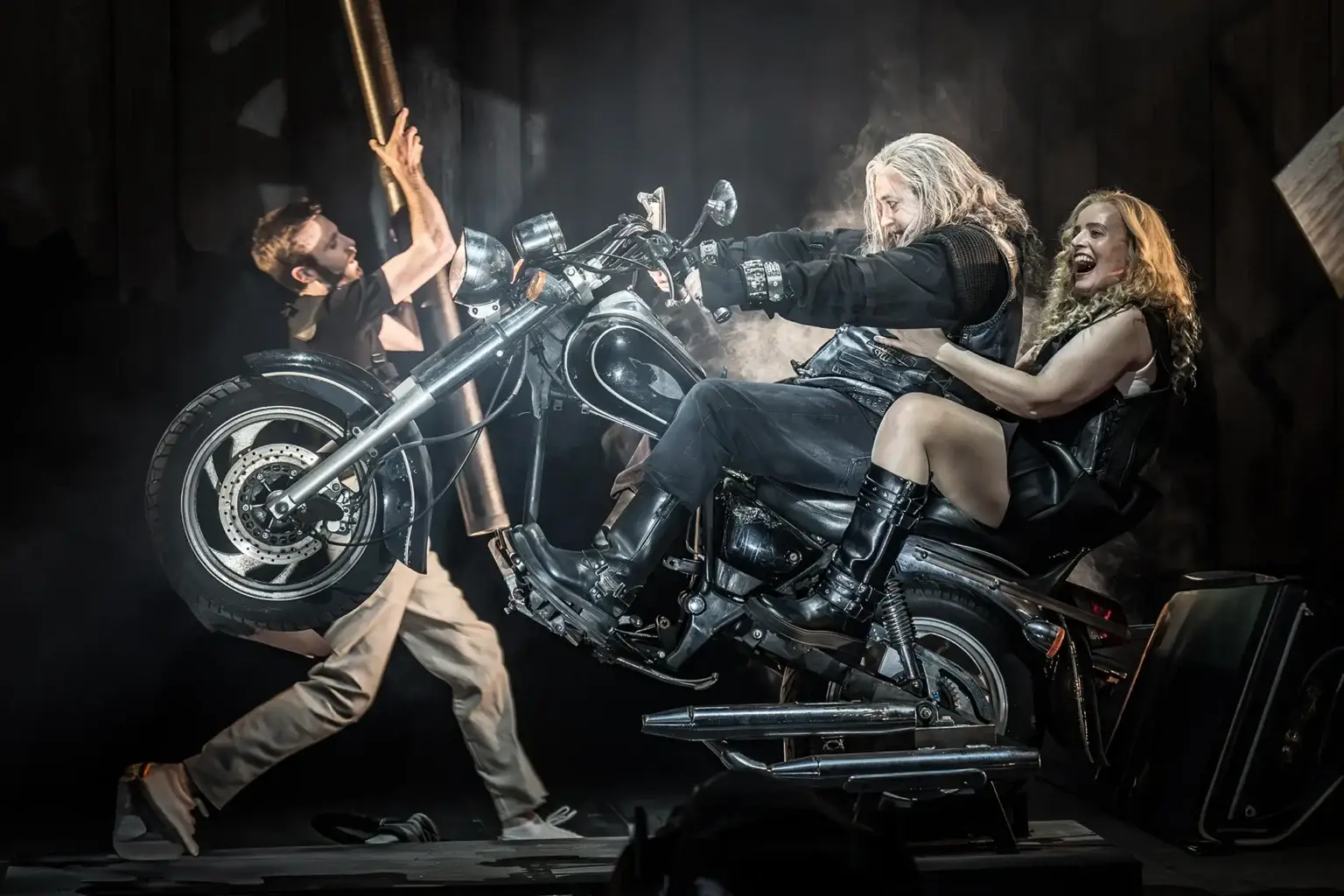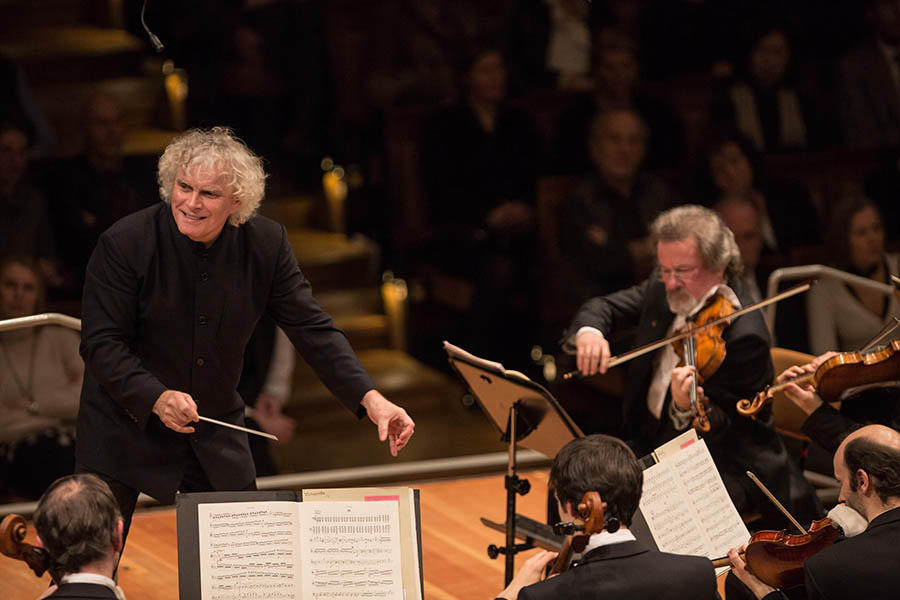Ukraine features almost on a daily basis on our digital front pages. In the Russo-Ukrainian war Western sympathy clearly lies with the underdog: Ukraine. Yet Tchaikovsky’s opera Mazeppa (1883), inspired by Pushkin’s poem Poltava, portrays the Ukrainian leader of the Cossack Hetmanate as a villain who betrays Russia. From a Russian perspective that view is hardly surprising. For a long time he was Peter the Great’s friend and loyal servant, but when he swore allegiance to the invading Swedes, just before the decisive battle at Poltava (1709), he became a traitor in Russian eyes. During recent ceasefire talks in Istanbul, Russian negotiators sarcastically reminded their Ukrainian counterparts of their heavy defeat at Poltava – adding ominously that history would repeat itself.
In his own lifetime Mazeppa wasn’t popular with all Ukrainians, because of his friendship with the Tsar. Since the dissolution of the Soviet Union his reputation has grown in stature and he was officially proclaimed a national hero in 1991. Therefore it’s today, when staging Tchaikovsky’s Mazeppa, impossible to ignore the ongoing war – and Russia’s threat to Ukraine’s sovereignty.
David Pountney, director of the current production at Grange Park Opera, grapples with this historical and political conundrum, but manages to find satisfying solutions that don’t simply portray Mazeppa as a heartless tyrant and traitor, and his friend and father-in-law Kochubey as the victim. In this contemporary setting David Stout’s Mazeppa is a speed freak, both chemically and in his fondness for two wheels. He wears shoulder length grey hair and is more comfortable in sleeveless leathers than traditional Ukrainian costume. There are only faint echoes of traditional (embroidered) vyshyvanka embroidery in the costuming.
Pountney wisely avoids too many references to the current situation in Ukraine – even though the staging is contemporary. Instead his focus is on Tchaikovsky’s central themes: destructive love (a recurring theme in his operas), ambition, betrayal and Mariya’s descent into madness. Loosely based on historical facts Tchaikovsky and his librettist Victor Burenin don’t offer a single flattering portrayal of the Ukrainians – and notably none of the characters are Russians.
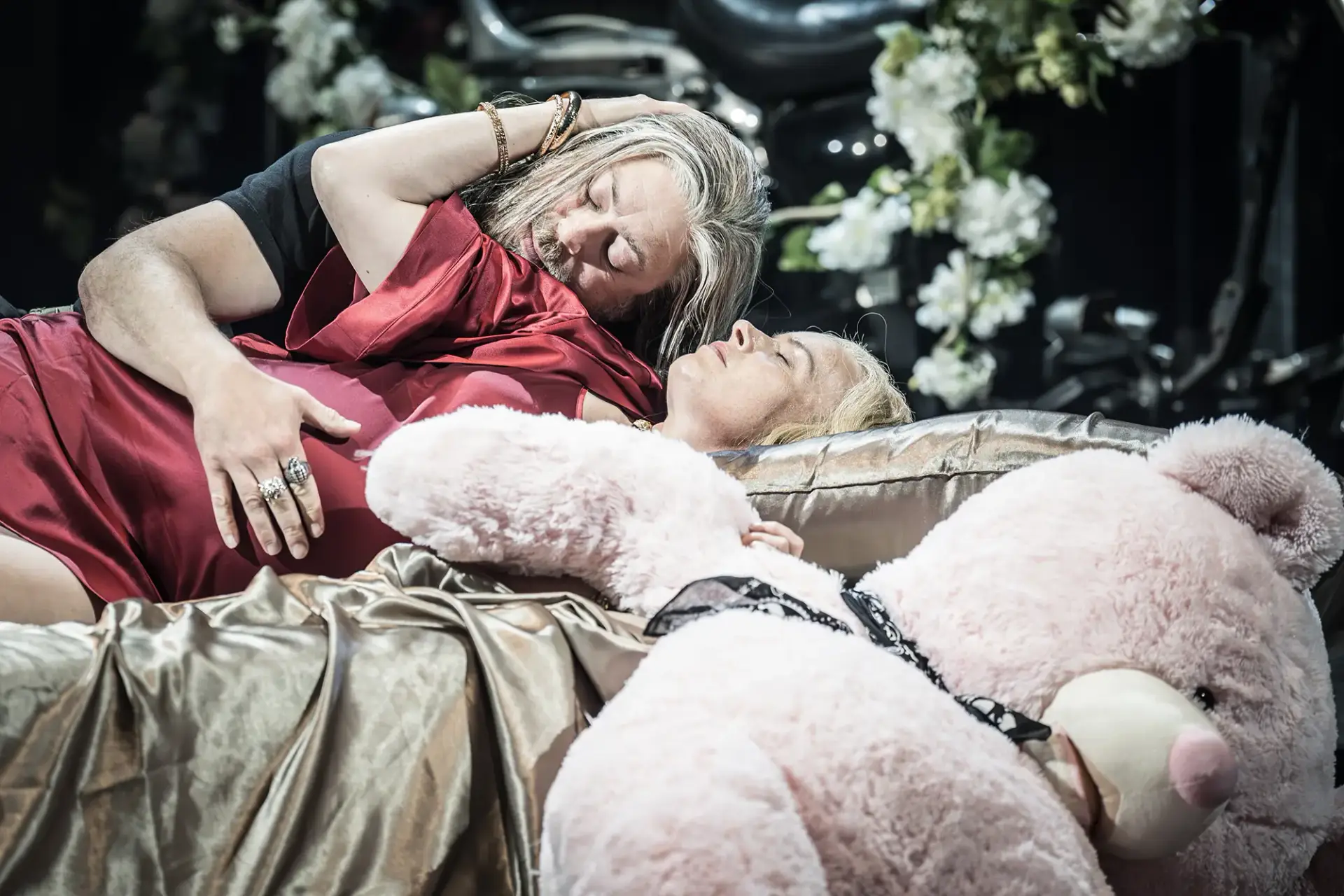
There’s cause for celebration; after a six-year absence, English National Opera has returned to The Grange Park Opera’s horseshoe-shaped Theatre in the Woods, with the efficient Mark Shanahan conducting.
Following a glowing orchestral Introduction we meet Mariya (Rachel Nicholls), the teenaged daughter of the landed gentleman Kochubey. She doesn’t want to join her friends in traditional games, consumed as she is by her infatuation with her father’s guest, the Hetman Mazeppa, who’s 50 years her senior. Her childhood friend Andrei (John Findon) is politely rebuffed. Mazeppa (David Stout), dressed to kill in a leather bike jacket, asks his host Kochubey for the hand of his daughter Maryia in marriage. Instead of celebrations, a heated row erupts and Mariya is forced to choose between her parents and the man she loves. No prizes for guessing – she elopes with the man with the fat motorbike ( mounted on a trolley). Their hurried flight is humorously illustrated with placards and telephone poles carried by chorus members to music originally written to accompany a Gopak (a traditional folk dance). After this. the smiles vanish and we enter a dark universe.
Kochubey takes revenge by informing Tsar Peter that Mazeppa is conspiring with the enemy – the Swedes. The Tsar, unconvinced by Kochubey ( Luciano Batinić), delivers the whistleblower to Mazeppa who confines him to his prison dungeon. The graphic torture scene leaves little to the imagination – Kochubey’s head is repeatedly shoved into a filthy toilet. Luciano Batinić sings the pained aria So This Is the Reward with a dignified tone and wide range of colour, befitting the Russian bass tradition.
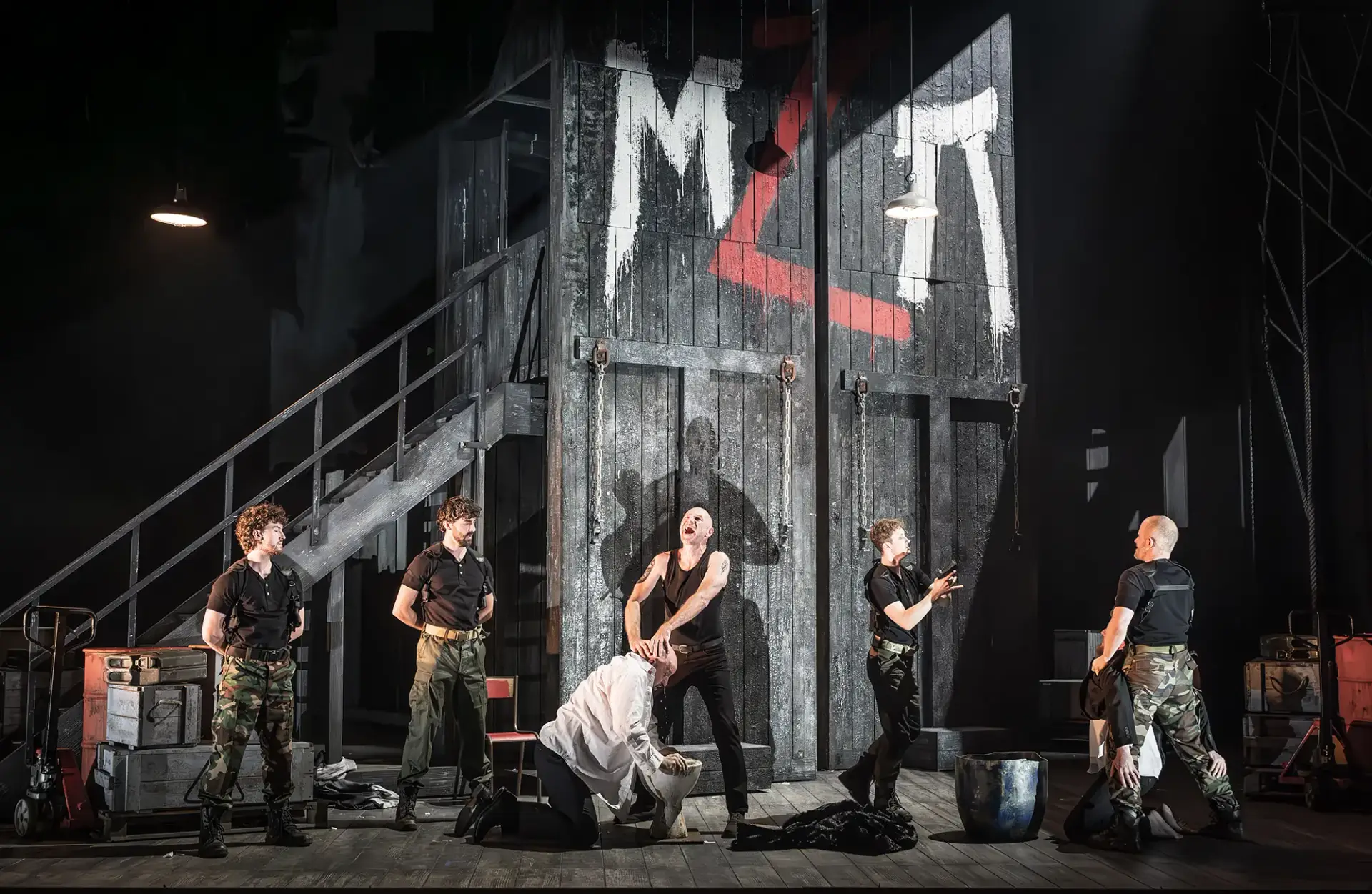
Mazeppa sports the look of a wild, coke-snorting biker, yet David Stout delivers his famous arioso with a velvety, suede-like smoothness. In the following duet, Mazeppa and Mariya – heavily pregnant and cuddling a giant pink bear – share a genuinely intimate looking moment. Mariya pledges full support for her husband’s power grab, but Mazeppa doesn’t share his murderous intentions. It falls to her anguished mother Lyubov (Sara Fulgoni) to reveal in a heart-rending scene that Mazeppa intends to kill Kochubey.
Though Rachel Nicholls occasionally lacks brilliance in Mariya’s highest tessitura, her compelling acting makes up for minor flaws. She fully inhabits the role of a deluded young woman blindly loyal to her husband, descending into madness upon arriving too late to save her father.
While The Battle of Poltava gets an epic, rousing treatment from the ENO orchestra, black coffins are rolled onto the stage. Lids are flung open and soldiers in gas masks and fatigues emerge out of the caskets, waiving black flags and performing sporty dance moves. The Swedes and their overstretched Cossack allies have been crushed. A badly wounded Mazeppa, aided by his henchman Orlik, bumps into lovelorn Andrei (John Findon). The young man is shot by Orlik before he can exact revenge on the old man. Mariya appears, clutching what looks like a bundle with a baby, and climbs into a coffin. Mazeppa discovers that there is no rhyme or reason to her and he has to be dragged away by Orlik. Mariya’s bundle turns out to contain nothing but grey dust. Instead she cradles the dying Andrei and sings him a gorgeous lullaby Sleep, My Baby, My Pretty.
This a haunting and heartbreaking end to an opera that deserves to be much better known. Dramatically there are moments when it sags and Andrei is a pretty dull role, but musically Mazeppa is almost on a par with both Eugene Onegin and The Queen of Spades. Grange Park Opera has with its splendid cast, chorus, and ENO done opera lovers a huge favour by staging this minor masterpiece that rarely is performed outside of Russia. Well worth a trip to the Grade I listed house and garden at West Horsley Place.
You can find full details about future performances of Mazeppa at Grange Park Opera here
